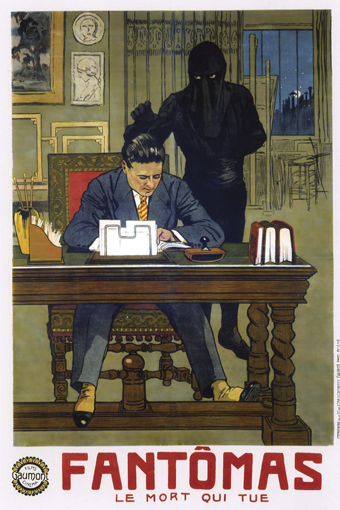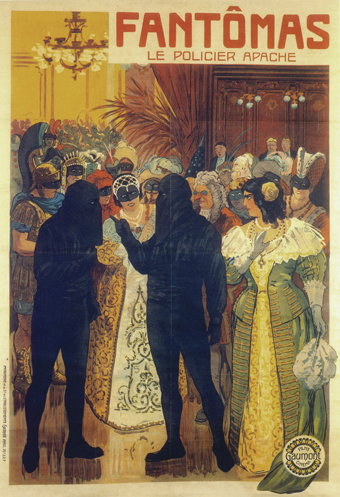
 |
|
|
|
The mysterious visitor's calling card is blank ... until Inspector Juve picks it up. A word begins to materialize on the card, like magic: "Fantômas!" The French silent serials of Louis Feuillade are a cultural milestone of the early 20th century, when chivalry gave way to the mass slaughter of WW1 and revolutionary ideas in politics and were mirrored by similar revolutions in art. Feuillade's tale of a fantastic criminal organization called Les Vampires buried the gothic tradition by linking crime and sex. As the slinky Irma Vep, creeping across rooftops in a revealing black leotard, the actress Musidora is said to have stirred the erotic imaginations of millions. Feuillade's Judex was an early example of the Mysterious Avenger character that would eventually evolve into comic book superheroes like Batman. The French master's first thriller serial smash was adapted from Marcel Allain and Pierre Souvestre's novel Fantômas. Carrying on the tradition of earlier literary arch-villains like Arsène Lupin, the ruthless Fantômas (René Navarre) uses uncanny disguise skills to commit murders and move undetected in Paris society. Fantômas's nemesis is Inspector Juve (Edmund Bréon), a wily sleuth whose efforts to capture the villain are repeatedly frustrated. Juve has a faithful sidekick in the handsome young Jerôme Fandor (Georges Melchoir), an intrepid reporter for the newspaper La Capitale. 
The original silent Fantômas serial is actually five short features ranging from sixty to ninety minutes apiece. As the villain spends most of his time disguised as somebody else -- he frequently impersonates his own murder victims -- each chapter begins with a gallery showing Fantômas in his various guises. Pre-war French audiences were apparently encouraged to try to spot Fantômas before his disguises are unmasked. The five chapters, all included in Kino International's Fantômas: The Complete Saga bear intriguing titles: Fantomas in the Shadow of the Guillotine, (Fantomas - A l'ombre de la guillotine); Juve vs. Fantomas (Juve contre Fantomas); The Murderous Corpse (Le Mort qui tue); Fantomas vs. Fantomas (Fantomas contre Fantomas) and The False Magistrate (Le Faux magistrat). The action lives up to the promise, as the first chapter sees the dastardly criminal first robbing a Princess and then seducing the lovely Lady Maud Beltham (Renée Carl) while disguised as the bearded Dr. Gurn. Fantômas will later blackmail Lady Maud to help him pull off other schemes. In other disguises, Fantômas utilizes accomplices to rob and murder an industrialist and steal a priceless string of pearls. He uses a disastrous train wreck to kill witnesses to a robbery. In "The Murderous Corpse" Fantômas frames an innocent artist for murder, fakes his suicide in jail and steals the body before Juve can examine it. Fantômas then makes a glove from the skin of the dead artist's hand, and uses it to leave the dead man's fingerprints at subsequent crime scenes. The big climax of the first installment sees Fantômas safely locked up and awaiting the guillotine. His confederates, aided by the seductive charms of Lady Maud, kidnap an actor playing Fantômas on stage and exchange him for Fantômas in the prison cell. Fantômas also makes numerous attempts on Juve's life. When a deadly boa constrictor fails, he dynamites an entire building. Juve and Fandor find themselves shooting at each other thanks to Fantômas's forged telegrams. The crime busters then must escape from a burning dockside oil depot. Fantômas always finds a way to escape Juve's clutches, sometimes literally. Juve and Fandor capture their quarry fair and square in the fashionable café Le Crocodile, and escort him to the street braced between them. But Fantômas simply runs away, leaving our heroes with their mouths agape -- the arch-villain has donned a coat with sleeves containing fake arms! The films are less primitive than one would expect. The camera is nailed down for most scenes, and interiors play out in wide or medium shots, often only one or two angles per scene. Exceptions include a pan that reveals that Fandor is sharing a room with a corpse, and a smooth elevator crane shot that follows a criminal up a tall ladder. Exterior scenes are like a time machine to the belle Époque, as antique motorcars share space with horse carts and electric trolleys on the Paris boulevards. Night scenes are ordinary daylight photography printed on blue-tinted film stock, a convention requiring an adjustment on the part of the viewer. In interiors, dousing a light switch plunges a room from a yellowish hue to blue darkness. 1 Actors play to the missing fourth wall, using a naturalistic acting style until confronted by shocking events. Introduced to Inspector Juve, a Fantômas henchwoman named Josephine (Yvette Andréyor) telegraphs a moment of panic to the audience, and then quickly reclaims her composure. Often in disguise, Fantômas more than once "addresses the camera" with an aside that says, "Yep, it's me." Another big laugh comes when the corrupt prison guard Nibet (Naudier) describes the "hot" Lady Maude, who has bribed him to arrange a private meeting with his prisoner. Nibet's hand gestures are undeniably French. Only occasionally is Fantômas seen in his full "man of mystery" garb, which resembles a black hood appropriate for an executioner. What makes the character so special in artistic terms is its relationship to the surrealist movement. In his pursuit of ill-gotten gains, the super criminal recognizes no laws and outrages decent society without the slightest remorse. He represents the idea that social restraints are merely conventions, and that total chaos could erupt at any moment. Fantômas strikes terror into the entitled class by taking their prized possessions, thus indulging the fantasies of those lower on the social scale. Fantômas commits his crimes in style, using elaborate disguises that prove that the establishment judges everything by appearances. His diabolically clever schemes most resemble the swindles inflicted by stock manipulators and financial frauds, thus giving the rich a taste of their own medicine. Fantômas makes personal identity unreliable, plastic; behind every benign face might be a murderous conspiracy. Who is Fantômas? Or is he everywhere? Viewers expecting quaint American-style silent serial thrills will discover some genuine brain-twisters in the final episodes, which run wild with the narrative convention of the deceptive impersonation. Fantômas impersonates a famous American detective named Tom Bob, arrived in France to show the locals how to catch the super criminal. While ostensibly hunting himself, "Tom Bob" proceeds to destroy Juve's reputation. He arranges to commit a murder at a society costume ball, knowing that more than a few attendees will arrive in "Fantômas" costumes. Fantômas assumes various secret identities to manage his own gang of Apache accomplices, to keep all the loot for himself. 2 
The final chapter The False Magistrate sees Fantômas held by the Belgian authorities. Juve wants to get him back to France to face a death sentence, so he engineers the villain's escape by taking his place in prison. The criminal returns to St. Calais disguised as the honorable Judge Pradier. Fantômas has already used inside information to interrupt a transaction for some valuable jewelry belonging to a Marquis. By attempting to place the blame on an innocent priest, he walked away with the jewels and the 25,000 francs. Fantômas now uses his guise as Judge Pradier to recover the loot from his confederates, murder the Marquis with gas, and blackmail his widow -- it turns out that the Marquise was having an affair with the real Pradier. He also takes advantage of his new authority to pardon his henchmen. Knowing he'll soon be caught and unmasked, the false judge issues anticipatory orders to have himself secretly set free, with the ruse that the Fantômas in custody is really Juve in disguise! Fantômas takes time out for a stalking scenes in the Métro and a few moments of tango dancing in Le Crocodile. Although slower than today's thrillers, the serial builds to frequent bursts of pulp ecstasy, as Juve struggles to neutralize Fantômas's fiendish schemes. Almost 100 years ago, barely a decade after the invention of motion pictures, the cinema had already invented its own brand of action-oriented excitement. Kino International's Fantômas: The Complete Saga is a 3-DVD set containing excellent transfers of the five separate chapters. The quality is quite good, better than many much newer silent films. The final chapter is missing several passages, which are covered with text inter-titles to maintain continuity. The tinting patterns mentioned above are quite charming in their effect. Appropriate library cues are edited to produce the soundtrack. A tense theme appears with every reveal of the diabolical villain. Some period French vocal tracks are heard whenever the story ventures into the crook's hideout, with its secret passage to the River Seine. It's amusing to note the 21st-century Gaumont logo, and then realize that these 100 year-old movies were originally produced by the same cinema company. The set's extras begin with commentaries by author David Kalat for the first two movies. The cinema expert fills almost two hours exploring the complicated world of Fantômas, which begins with a discussion of 19th century escapist literature and ends in a number of film versions, superhero reiterations and other cultural descendants. Kalat's attention to detail is staggering -- pulp fantasy thrillers of this vintage influenced important artistic movements and are the basis for our modern comic book culture. Other extras point to an earlier Kino release, Gaumont Treasures 1897-1913, a set that charts the careers of several of Gaumont artistic directors, including Louis Feuillade. The Fantômas set contains the director's prestigous pageant film The Nativity and one of his experimental "Life As It Is" short subjects, The Dwarf. A new ten-minute docu Louis Feuillade: Master of Many Forms explains the director's tenure at Gaumont and his rise to fame as the maker of enormously popular serials.
On a scale of Excellent, Good, Fair, and Poor,
Footnote:
1. According to the excellent documentary on disc one, the film restorers found mid-scene splices whenever lights are turned on or extinguished, indicating that these were points where original prints cut to differently colored film stocks.
2. Circumstantial evidence of the relevance of Fantômas as an analog for ruthless business practices: Lars Von Trier's comedy The Boss of It All is about a crooked company owner who cheats his employees by masquerading as his own lowly shop manager, passing on bad news as if he had no choice in the matter. Fantômas teases the distinction line between business exploitation and criminal enterprise.
Reviews on the Savant main site have additional credits information and are often updated and annotated with reader input and graphics. Also, don't forget the 2010 Savant Wish List. T'was Ever Thus.
Review Staff | About DVD Talk | Newsletter Subscribe | Join DVD Talk Forum |
| ||||||||||||||||||